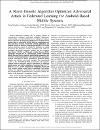A Novel Genetic Algorithm Optimized Adversarial Attack in Federated Learning for Android-Based Mobile Systems
التاريخ
2025البيانات الوصفية
عرض كامل للتسجيلةالملخص
Federated Learning (FL) is gaining traction in Android-based consumer electronics, enabling collaborative model training across decentralized devices while preserving data privacy. However, the increasing adoption of FL in these devices exposes them to adversarial attacks that can compromise user data and device security. Given that Android applications are frequent targets for malware, ensuring the integrity of FL-based malware detection systems is critical. We introduce an attack framework that integrates Genetic Algorithms (GA) with two prominent adversarial techniques, namely, the Fast Gradient Sign Method (FGSM) and Projected Gradient Descent (PGD), specifically designed for FL environments. Unlike traditional attacks that use fixed or heuristic perturbation parameters, our GA-driven method dynamically evolves perturbation parameters through multi-objective fitness optimization, producing highly adaptive and effective adversarial examples. The experimental results on the CICMalDroid 2020, KronoDroid, and AndroZoo Android malware detection datasets demonstrate a significant attack success rate, with a reduction of accuracy from 96–97% down to 24–29%, which surpasses the traditional FGSM and PGD variants. Similar results with GA-optimized PGD further validate our approach. Furthermore, our results demonstrate that existing defense mechanisms fail to adequately mitigate the impact of the proposed GA-optimized attacks.
معرّف المصادر الموحد
https://www.scopus.com/inward/record.uri?partnerID=HzOxMe3b&scp=105008027193&origin=inwardالمجموعات
- الابحاث المتعددة التخصصات والتصاميم االذكية [45 items ]


